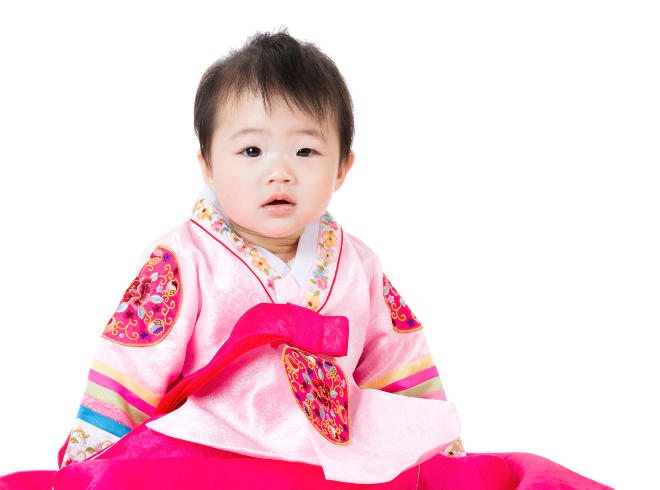20 Interesting Facts about South Korea
South Korea is a vibrant and fascinating country with a rich cultural history. It's home to some of the world's most advanced technology, incredible cuisine, and a unique language. But there's more to South Korea than meets the eye. Here are some fun and interesting facts about this amazing country that you may not know!

These are just a few fun facts about South Korea that you may not have known before!
1.) Mukbang
South Korea is known for its love of "mukbang," which is a live streaming trend where people watch others eat large amounts of food. Some mukbang streams can last for hours and feature a wide variety of foods, from traditional Korean dishes to fast food. The trend has become so popular that there are now professional mukbang "stars" who make a living from streaming themselves eating. It might be considered as an unusual trend for some, but for South Koreans, it is a way to bond with others over a shared love of food.
2.) Dual Calendar System
South Korea is the only country in the world with a dual calendar system, using both the Gregorian calendar and the traditional lunar calendar. This means that different holidays and events can be celebrated on different dates, depending on which calendar is used. For example, while Lunar New Year falls on January 25th in 2020 according to the Gregorian calendar, it falls on February 4th according to the lunar calendar. This dual system allows for more flexibility when planning events and activities, as well as allowing people to choose which calendar they prefer to use. The dual system also ensures that important cultural traditions are kept alive and celebrated throughout South Korea.
3.) 70% of Koreans have at least a bachelor's degree or higher
South Koreans are some of the most educated people in the world, with nearly 70 percent having at least a bachelor's degree or higher. This is an impressive statistic and reflects the commitment to education that South Koreans have. Their educational system is highly competitive, with a focus on academic excellence. South Korea also has one of the highest rates of college enrollment in the world, and many students attend universities abroad as well. Education is highly valued in South Korean culture, and students are expected to work hard to reach their goals. The country also invests heavily in research and development, making it a leader in science and technology. South Koreans' dedication to education has made them one of the most educated populations in the world, helping them achieve great success both domestically and internationally.
4.) Highest bridge in the world Yeongjong Grand Bridge
South Korea is home to the highest bridge in the world, the Yeongjong Grand Bridge. This remarkable structure stands at an incredible height of 1,849 feet, making it one of the most impressive engineering feats of its kind. The bridge was designed by renowned architect and engineer Isozaki Arata and completed in 2017. Spanning over a mile long, this amazing feat of engineering has become a symbol of South Korea's modernity and progress. It connects Incheon International Airport to Yeongjong Island, providing travelers with easy access to the island's many attractions. The Yeongjong Grand Bridge is an impressive sight to behold and is a great example of South Korea's commitment to infrastructure development.
5.) K-Beauty Trend
South Korea has a trend of "K-beauty" or Korean beauty products. These products have become increasingly popular around the world, and they often feature unique and quirky ingredients, such as snail mucin and donkey milk. Some of the products are also known for their innovative packaging and designs that are as funny as they are unique, like a face mask in the shape of a panda. Also, there are some beauty products like "lip and cheek tint" that come in the shape of a cute and funny character, like a bear or a rabbit. This trend of K-beauty is not only about taking care of your skin but also about having fun and enjoying the process.
6.) Land of festivals
South Korea is a land of festivals, and there is no shortage of exciting events to take part in throughout the year. The Boryeong Mud Festival, held on Daecheon Beach each summer, is one of the country's most popular events. People from all over the world come to take part in this unique festival, which includes mud wrestling, mud slides and other fun activities. Meanwhile, the Busan International Film Festival is an annual event that has been running since 1996. It showcases some of the best films from around Asia and beyond, as well as hosting workshops and seminars for budding filmmakers. Other famous festivals include the Seollal Lunar New Year celebrations and the Jeju Fire Festival.
7.) Boke Comedy Shows
Boke is a type of comedy skit in which one person acts as the "boke" or the "straight man" and the other person acts as the "tsukkomi" or the "comedian". This type of comedy is usually seen in South Korean variety shows and it is known for its physical comedy and witty banter between the two performers. This comedy style is so popular that it has become a cultural phenomenon in South Korea and many people enjoy watching Boke comedy skits on TV. The Boke comedy skit is so popular that it is also been used as a way of advertisement and commercials.
8.) Did you know it is common in Korea to ask about blood types?
This is because Korean culture has linked blood type with personality, and many Koreans believe that knowing someone’s blood type can help them understand the person better. For example, people with type O are often seen as outgoing and energetic, while those with type A are seen as more reserved and organized. People in Korea may even use a person’s blood type to determine compatibility between two people. Asking about someone’s blood type is also seen as a way of breaking the ice and making conversation. By asking this question, it shows that you are interested in learning more about the other person on a deeper level.
9.) A New-born in South Korea is One Year Old

In South Korea, a newborn baby is considered one year old when they are born. This is due to the fact that in Korean culture, a baby's age is calculated based on the number of lunar years since their conception. This means that even though a baby has only been alive for a few hours or days, they are already one year old. It can be confusing for those who don't understand this concept, but it is an important part of Korean culture and tradition. In South Korea, babies celebrate their first birthday on the day they were born, regardless of how long they have actually been alive. This fact makes it clear that in South Korea, being one year old comes with its own unique set of celebrations and traditions.
(Current year – your birth year) + 1 = Korean age
10.) Did you know that there are more than 200 types of kimchi in South Korea?
Kimchi is a traditional Korean side dish made from fermented vegetables and spices. It is usually served as a side dish to complement the main course, but can also be enjoyed as an appetizer or snack. Different regions of South Korea have their own unique recipes for kimchi, which makes it incredibly diverse. Some popular varieties include cabbage kimchi, cucumber kimchi, and radish kimchi. Kimchi is known for its strong flavor and intense spiciness, making it a popular accompaniment to many dishes. With so many different types of kimchi available in South Korea, there’s sure to be something for everyone!

11.) 20% of Koreans share the same surname
It is estimated that approximately twenty percent of Koreans share the same surname. This is due to a long and complex history of family names in Korea. For centuries, there were only a few surnames used by the ruling elite, but over time, more surnames were adopted and spread throughout the population. Today, some of the most common surnames are Kim, Lee, Park and Choi. Many Koreans take pride in their surname as it can be seen as a sign of heritage and connection to their ancestors. It has also been found that many people with the same surname often have similar physical features or characteristics due to shared genetics. Despite this similarity, each person’s individual identity is still respected and celebrated.
12.) Men wearing makeup is normal in South Korea
It is a fact that men wearing makeup is normal in South Korea. In South Korea men have become increasingly more open to the idea of cosmetic use for both health and beauty. In the past, it was mostly women who wore makeup, but now men are also taking part in this trend. Men in South Korea often wear makeup to enhance their natural features and give them a more youthful appearance. They also use cosmetics to protect their skin from the sun's harmful rays and other environmental factors. Furthermore, many South Korean men feel that wearing makeup can help them look more attractive and boost their self-confidence. It has become so common that it is no longer seen as something unusual or out of the ordinary.
13.) Spam gifts are a thing in Korea
Spam gifts are a thing in Korea, especially during the Chuseok holiday. It is believed that the tradition of sending spam gifts began during the Korean War when American soldiers would send canned meat to their families back home. Nowadays, spam gifts are given to family members and friends as a way to show appreciation and gratitude.
14.) Border between North and South the DMZ is a wildlife haven
The DMZ, or Demilitarized Zone, is a unique wildlife haven in the Korean peninsula. Spanning several kilometers across the border between North and South Korea, the DMZ has been an untouched natural area for decades due to its status as a buffer zone. As a result of this protection, the area has become home to an incredible variety of wildlife, including rare species such as black bears and Amur leopards. In addition to providing sanctuary for endangered species, the DMZ also serves as an important habitat for migratory birds and other species that travel through the region each year. The abundance of nature in the DMZ has made it a popular destination for eco-tourists who are interested in seeing some of Korea’s most beautiful landscapes and wildlife. As such, it is an invaluable resource that must be protected if we hope to preserve the biodiversity of this unique region.
15.) Tetraphobia - 4 is an unlucky number in South Korea
Tetraphobia is a fear of the number four, which is considered to be an unlucky number in South Korea. It is believed that saying the word “four” will bring bad luck, and many people avoid using it as much as possible. In Korean culture, four is seen as an unlucky number because its pronunciation is similar to the Korean word for death. As a result, many buildings in South Korea lack a fourth floor, and hospitals often skip the fourth floor when numbering their floors. Additionally, some phone numbers are not assigned if they contain the digit 4 or combinations of digits that add up to 4. Tetraphobia also affects other aspects of life in South Korea; for example, some people choose to get married on dates that do not include the number 4. All of these customs demonstrate how deeply tetraphobia has been ingrained into Korean culture over time.
16.) Live Octopus as a Unique Delicacy
South Korea is known for its vibrant culinary scene, and one dish that stands out as a truly unique experience is live octopus, locally known as sannakji. This daring delicacy offers a one-of-a-kind gastronomic adventure for those seeking to push their culinary boundaries.
In sannakji, the octopus is prepared by slicing it into bite-sized pieces, which are served immediately, often still squirming on the plate. The sensation of the tentacles moving in your mouth adds a whole new level of excitement to the dining experience.
While the idea of eating live octopus may seem unusual or even intimidating to some, it's important to note that the dish is prepared with utmost care and expertise. The octopus is typically served fresh, ensuring its quality and minimizing any potential risks.
17.) Valentine's Day is for guys
In South Korea, Valentine's Day is a bit different from the Western tradition. On February 14th, it's the women who give gifts to men, usually in the form of chocolates, flowers, or other thoughtful presents. However, a month later, on White Day (March 14th), the men reciprocate by giving gifts to the women.
18.) Seoul: A Metropolis of Remarkable Scale
Seoul is a city that defies expectations, stretching across a vast expanse that seems to have no end. With a population exceeding 10 million people, it stands tall as one of the most populous cities in the world. Yet, it's not just the number of residents that makes Seoul impressive—it's the endless possibilities that come with such a massive urban center.
Seoul's magnitude is not limited to its physical size alone; it extends to the depth and diversity of experiences it offers. Each neighborhood within the city boasts its own distinctive character and charm, creating a tapestry of vibrant communities. Whether you find yourself exploring the trendy neighborhoods of Hongdae and Gangnam or wandering through the historic alleyways of Bukchon Hanok Village, you'll be captivated by the sheer variety and richness of Seoul's tapestry.
19.) Koreans Are Shopping Addicts
Shopping is a national pastime in South Korea. From bustling street markets to glamorous shopping districts like Myeongdong and Gangnam, Koreans take their fashion seriously. Trendy clothing, cosmetics, and accessories can be found in abundance, catering to various styles and budgets.
20.) Plastic Surgery in South Korea is Normal
South Korea is renowned for its booming cosmetic surgery industry. A significant number of Koreans, both men and women, opt for plastic surgery to enhance their appearance. Procedures such as double eyelid surgery and rhinoplasty are incredibly popular, reflecting the importance of beauty standards in Korean society.
Post Last Updated

